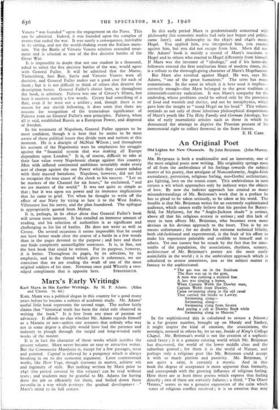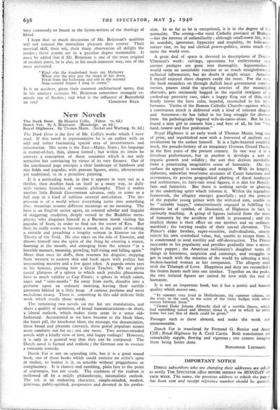An Original Poet
MR. BETJEMAN is both a traditionalist and an innovator, one of the most original poets now writing. His originality springs most of all from the ambivalence of his feelings towards the subject matter of his poetry, that amalgam of Nonconformity, Anglo-Irish ascendancy, perversion, religious feeling, neo-Gothic architecture, gas lighting, love on the tennis court. This ambivalence in turn creates a wit which approaches only by indirect ways the objects of love. By now the indirect approach has created so many misunderstandings of Mr. Betjeman's work that in a preface he has to plead to be taken seriously, to be taken at his word. The trouble is that Mr. Betjeman writes for an extremely sophisticated audience, which cannot really believe that his passion for Butter- field, for Myfanwy, for the " Anglo-Jackson shade" is serious, above all that his religious ecstasy is serious ; and this lack of trust in turn affects Mr. Betjeman, who becomes even more devious in his devious approach to the heart. This is by no means unfortunate ; for no doubt his extreme technical felicity, both old-fashioned and experimental, is the fruit of his effort to make his experience palatable and credible to himself and to others. Yet one cannot but be struck by the fact that for nine.. tenths of the population, the associations, rhythms, scenery, architecture of Mr. Betjeman's poems are the most easily assimilable in the world ; it is the ambivalent approach which is calculated to arouse uneasiness, just as the subject matter is fantasy to the sophisticated.
"The gas was on in the Institute The flare was up in the gym, A man was running a mineral line A lass was singing a hymn, When Captain Webb the Dawley man, Captain Webb from Dawley, Came swimming along in the old canal That carried the bricks to Lawley.
Swimming along— Swimming along—
Swimming along from Severn And paying a call at Dawley Bank while Swimming along to Heaven."
In the sophisticated this is calculated to arouse a frisson ; in a far greater number, brought up on Moody and Sankey, it might inspire the kind of emotion, the associations, the nostalgia, aroused in others by, let us say, Inside of King's College Chapel. Mr. Betjeman's world is not the creation of a sophisti- cated fancy ; it is a genuine existing world which Mr. Betjeman has discovered, the world of the lower middle class and the
suburban genteel ; for them it is the world of Nature, and perhaps only a religious poet like Mr. Betjeman could accept it with so much pietism and passivity. Mr. Betjeman, if not quite a saint, is certainly a mystic. And in this book the degree of acceptance is more apparent than formerly,
and corresponds with the growing influence of religious feeling. Here there are at least three poems which express that feeling directly ; two of them are certainly failures ; a third, "The Olney Hymns," seems to me a genuine expression of the calm which .ones of religious conflict resolved ; it is an emotion that may very commonly be found in the hymn-writers of the theology of blood. I hope that so much discussion of Mr. Betjeman's qualities will not conceal the immediate pleasure they convey. Their metrical skill, their wit, their sharp observation all delight the reader; these poems are in a peculiar degree memorable. It must be added that if Mr. Betjeman is one of the most original of modern poets, he is also, in his mock-innocent way, one of the most perverted.
"Kind o'er the kinderbank leans my Myfanwy White o'er the play pen the sheen of her dress, Fresh from the bathroom and soft in the nursery Soap-scented fingers I long to caress." Is it an accident, given their common architectural tastes, that in his amatory ecstasies Mr. Betjeman sometimes strangely re- minds one of Ruskin; and what is the influence of Butterfield



































 Previous page
Previous page